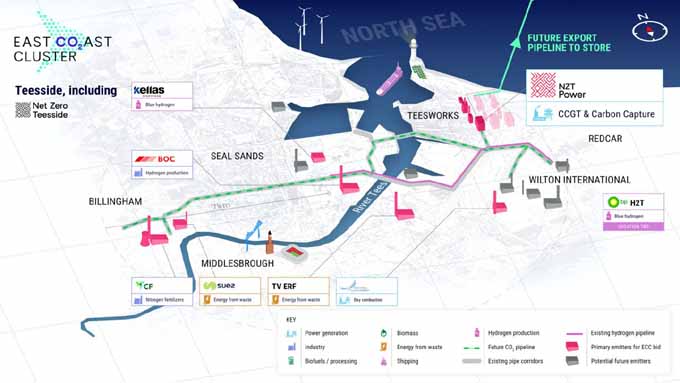- Two consortiums selected to participate in a Front End Engineering Design (FEED) competition for the Net Zero Teesside Power project and the Northern Endurance Partnership’s carbon compression infrastructure in Teesside
- Net Zero Teesside Power is a first-of-a-kind gas-fired power project – fully integrated with carbon capture technology, with emissions planned to be exported and securely stored by the Northern Endurance Partnership
- Project expected to provide flexible, low carbon electricity sufficient for around 1.3 million homes, progressing the deployment of carbon capture technology in line with the UK government’s 10-point plan

On behalf of its partners, bp – the operator of Net Zero Teesside Power (NZT Power) and the Northern Endurance Partnership (NEP) – has awarded contracts as part of its dual Front End Engineering Design (FEED) competition to two separate consortiums of engineering, carbon capture licensors, power providers and EPC contractors.
The awards represent an important next step towards the proposed development of the UK’s first full-scale integrated power and carbon capture project. Investing in carbon capture, usage and storage (CCUS) is a key point of the UK government’s 10-point plan for a green industrial revolution, announced in November 2020.
In October 2021, the UK government selected the Northern Endurance Partnership’s East Coast Cluster as one of the first two clusters be taken forward as part of its carbon capture and storage (CCUS) cluster sequencing process. The Northern Endurance partnership, which bp leads as operator, will provide the common infrastructure needed to transport CO2 from emitters across the Humber and Teesside to secure offshore storage in the Endurance aquifer in the Southern North Sea.
The two groups will now design and submit development plans for NZT Power’s proposed power station and carbon capture plant, and NEP’s planned Teesside high pressure carbon dioxide (CO2) compression and export facilities.
The two selected contractor groups are:
- Technip Energies and General Electric consortium: led by Technip Energies and including Shell as a subcontractor for the provision of the licensed Cansolv CO2 capture technology and Balfour Beatty as the nominated construction partner.
- Aker Solutions Doosan Babcock and Siemens Energy consortium: led by Aker Solutions and including Aker Carbon Capture as a subcontractor for the provision of the licensed CO2 capture technology.
The two consortiums will each deliver a comprehensive FEED package, led from their UK offices, over the next 12 months. Following the completion of the FEED process, the two consortiums will then submit Engineering, Procurement and Construction (EPC) proposals for the execution phase. As part of the Final Investment Decision expected in 2023, a single consortium will be selected to take the project forward into construction.

Louise Kingham, bp’s UK head of country and senior vice president of Europe, said:
“Moving to Front End Engineering Design is a major step forward for Net Zero Teesside Power and the development of the Northern Endurance Partnership. This first-of-a-kind project has the potential to deliver enough low carbon, flexible electricity to power around 1.3 million homes, and can help secure Teesside’s position at the green heart of the country’s energy transition.”
Andy Lane, MD Northern Endurance Partnership, said:
“The Northern Endurance Partnership will play a key role in the UK’s journey to net zero, by providing the transportation and storage infrastructure which enables the decarbonization of a range of industries across Teesside and the Humber too.
“Today’s news is a clear signal of momentum within the East Coast Cluster following our selection in October as one of the UK’s first two carbon capture and storage clusters by the UK government.”
Tees Valley Mayor Ben Houchen said:
“This is the latest milestone in delivering this game-changing facility on Teesside. Net Zero Teesside Power puts our region, our engineers and our scientists at the centre of plans for the UK to be net zero by 2050 and with it thousands of good-quality, well paid jobs developing the cleaner, safer and healthier industries of the future. It is also critical for safeguarding the thousands of jobs in our chemicals and processing industries – industries we lead the world in.”
NZT Power, a joint venture between bp and Equinor, is a full-scale gas fired-power station fully integrated with carbon capture. The project is expected to provide flexible, dispatchable low carbon electricity to complement the growing deployment of intermittent forms of renewable energy such as wind and solar.
The contracts also include FEED for NEP’s Teesside facilities that will gather and compress CO2 from NZT Power and other regional sources and export it offshore for permanent sub-surface storage in the Endurance carbon store. NEP will also take CO2 captured from a range of projects in the Humber region as part of the East Coast Cluster. The Northern Endurance Partnership is a joint venture between bp, Equinor, National Grid Ventures, Shell and TotalEnergies.
Taking emissions from both the Teesside and Humber regions, the East Coast Cluster has the potential to transport and securely store nearly 50% of all UK industrial cluster CO2 emissions – up to 27 million tonnes of CO2 emissions a year by 2035. It anticipates creating and supporting an average of 25,000 jobs over 2023 to 2050, with approximately 41,000 jobs at the project’s peak in 2026.
NZT Power expects to submit a bid in January 2022 for selection as part of the phase-2 of the UK government’s carbon capture, usage and storage (CCUS) cluster sequencing process. In October, the Northern Endurance Partnership-led East Coast Cluster was named as a Track-1 cluster in the first phase of the sequencing process.
Jacob Young, Conservative MP for Redcar, said:
“Net Zero Teesside represents another trailblazing innovation of the kind that is putting Teesside at the very centre of the UK’s net zero ambitions.
“Once completed, the Net Zero Teesside project will provide low carbon electricity to over 1 million homes using carbon capture technology to help meet the demands of the UK government’s 10-point plan for a Green Industrial Revolution.
“Having consortiums of such prestige working towards the designs which will make these innovations a reality is a hugely important step and I am delighted to see the progress that continues at pace with this project, delivering new, clean, green jobs for Teessiders.”
Ewan Drummond, bp’s senior vice president, projects, said:
“The signing of the dual FEED contracts today is the culmination of an extensive market engagement process over the past 18 months, and we are excited to be working with the selected Aker and Technip UK-led consortiums. Our contracting strategy enables early selection of carbon capture licensors and power providers along with EPC and construction contractors to minimize the technology and execution risks whilst allowing each consortium to differentiate themselves in their designs and execution approaches.”
Arnaud Pieton, CEO of Technip Energies, commented:
“We are honoured to have been selected, along with GE Gas Power, our consortium partner, to work on Net Zero Teesside Power, a flagship carbon capture project in the UK energy sector. Led by Technip Energies, the consortium will be supported by Shell Catalysts & Technologies, provider of the licensed Cansolv CO2 capture technology, and Balfour Beatty, our UK construction partner. Our capabilities in carbon capture projects and technology integration, combined with GE Gas Power’s expertise in natural gas combined cycle plant engineering, operability, and plant integration, will support bp’s goal of developing one of the first decarbonized industrial clusters in the world. This project perfectly illustrates that cross-industries collaboration is central to reaching net zero targets.”
Aker Solutions’ CEO Kjetel Digre said:
“Net Zero Teesside is a landmark development for the UK and an important step on the journey to net zero. Our consortium of Aker Solutions, Siemens Energy and Doosan Babcock is exceptionally proud to be working together with bp on this ground-breaking project to support the energy transition.”
About Net Zero Teesside Power
- Net Zero Teesside Power is a joint venture between bp and Equinor, with bp leading as operator.
- Net Zero Teesside Power will be the world’s first commercial-scale gas-fired power station with carbon capture and will share the CO2 transportation and storage infrastructure being developed by the Northern Endurance Partnership.
- NZT Power helps support the UK government’s commitment to fully decarbonize the power system in the UK by 2035, with the potential to provide low carbon power for up to 1.3m homes.
- NZT Power supports greater deployment of renewable energy such as wind and solar by providing flexible, dispatchable low carbon electricity generation which backs up intermittent renewables – crucial for periods when the wind isn’t blowing, and the sun isn’t shining.
About the Northern Endurance Partnership and the East Coast Cluster
- The Northern Endurance Partnership is a joint venture between bp, Equinor, National Grid Ventures, Shell, and TotalEnergies – with bp leading as operator.
- The Northern Endurance Partnership’s East Coast Cluster, which unites the Humber and Teesside with infrastructure to decarbonize industry and establish a platform for economic growth, was selected as a track one cluster in the UK government’s first phase of the carbon capture, usage and storage (CCUS) cluster sequencing process.
- By uniting the Net Zero Teesside and Zero Carbon Humber projects, the East Coast Cluster represents the UK’s biggest opportunity to:
- Decarbonize industry: transporting and storing almost 50% of the UK’s total industrial cluster emissions.
- Support low carbon levelling-up: creating and supporting an average of 25,000 jobs per year to 2050 and underpinning new low carbon industries in the north of England.
- Kick-start a hydrogen economy: supporting the creation of low carbon hydrogen projects to deliver 70% of the UK’s hydrogen target for 2030.
- Demonstrate global net zero leadership: establishing the Humber and Teesside as a globally competitive low carbon hub for industry and innovation, creating international momentum towards net zero.
 KEYFACT Energy
KEYFACT Energy